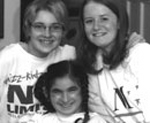It is the accepted view in countries around the world that the right to education is a fundamental right for everyone. However there is still a wide gap between this understanding and reality. This is particularly the case for the 77 million disabled children and young people around the world 90% of whom don’t attend school. This is despite the UN Convention on the Rights of the Child Article 28 , the EU Charter of Fundamental Rights’ Article 14, the 1994 Salamanca Statement and more recently Article 24 of the UN Convention on the Rights of Persons with Disabilities.
For some time now it has been the aim of the UK Inclusion movement to shift the debate away from ‘inclusion vs segregation’ because all evidence shows that education that is ‘inclusive’ benefits not only disabled learners but the whole of society.
Invited by the ‘Alliance for Inclusive Education’ Maresa MacKeith (accompanied by Caroline MacKeith and Ange Taggart) took part in an inspirational project* bringing together families, young disabled adults and professional working together across Europe from other countries with different perspectives on inclusion. The project aimed to assist in moving the debate on by focusing on current good practice in inclusive education working with each of the partners involved to disseminate that good practice widely across Europe.
It was a fabulous opportunity to meet people from all over Europe taking inclusive education seriously. Over a period of two years delegates from different countries met together in Iceland, France, Italy, Romania and the UK to both work on the project and visit classrooms to experience a range of international education systems at different stages of putting inclusive education into practice.
“We were able to listen to each other and move out of our own zones of knowledge” Maresa.
Working with partners from other EU countries broadened our views enormously and helped us to clarify what needs to be done here as well as noticing what we do well here. One of the key outcomes for the project was to gain an agreed definition of inclusive education.
” It’s not about an end product, it’s a way of being, a constantly evolving process that goes on for life” Maresa.
The project combined the varied knowledge, experience and cultural differences of three core groups, young disabled adults, family members and professionals to develop a resource for future use.
“It broadened our views enormously and clarified what needed to be done. It helped us put into perspective what we do well in the UK but also what some other countries were doing better.” Caroline MacKeith.
At the end of the two years we heard repeatedly from participants that they’d gained more confidence, there was a greater understanding amongst the young disabled adults that they are the experts in their own lives and should have genuine choice and control about their education.
“It was important to be listened to and taken seriously and know that I’m already doing a good job” Maresa.
The Alliance for Inclusive Education has produced three resources based on learning outcomes
An Inclusive Education Guide for Families

This is a web based Guide for Families to help them seek inclusive education opportunities for the disabled child. The Guide has been written by Linda Whitehead and encourages families to think of themselves as allies to their disabled children by thinking about disability in a positive way by using the Social Model of Disability. The Guide will help families ask the right questions of schools and to be more confident to seek out a school that is inclusive of all children from the local community. The Guide is based on learning and evidence from visits to each of these countries and is funded by Grundtvig
Download pdf
Advocacy and Training Toolkit

This is a toolkit to support advocacy and training work led by disabled people. The toolkit was developed by disabled people from France, Italy, Iceland and the UK and is based on learning and evidence from visits to each of these countries. The toolkit offers information and advice to disabled people across Europe to encourage their participation and leadership in the implementation of inclusive education for disabled children and young people. The Advocacy & Training toolkit is funded by Grundtvig
An Inclusive Education Guide for Professionals

This Guide has been written by education and social care professionals from France, Italy, Romania, Iceland and the UK and is based on evidence and learning from each of these countries in terms of what works for the inclusion of disabled children and young people in mainstream education.
The Guide offers practical advice and information to those professionals already working with disabled children and their families and also to those professionals unfamiliar with this area of work. The Guide is based on learning and evidence from visits to each of these countries and is funded by Leonardo

